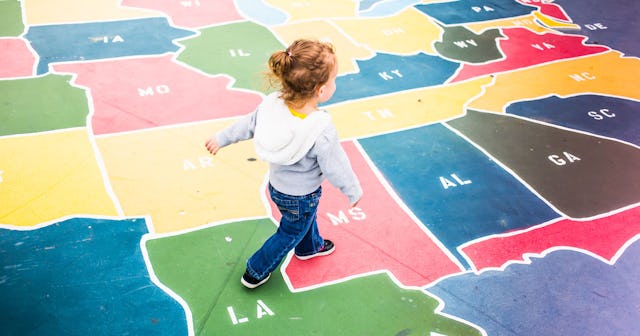The Best (And Worst) States To Have A Baby, Ranked

Starting a family is one of the most special times in (most) people’s lives, but it’s obviously no secret that from the moment you become pregnant, you immediately are faced with making so many decisions. These decisions range from small things like the type of vitamins that you’ll take, to way bigger decisions like the type of birth you hope to have. Let’s go ahead and add another decision to that list: the best state to have a baby.
For most people, thoughts about where you choose to call home start long before you have a family. WalletHub conducted a recent study, which included findings from the ongoing pandemic, to determine which states were the best (and worst) states to have a baby right now.
In order to determine the best and worst states, WalletHub compared the 50 states and the District of Columbia across four key dimensions (cost, health care, baby-friendliness and family-friendliness) using 31 relevant metrics. The results then determined the best/worst list.
Best States to Have a Baby
- Massachusetts
- Minnesota
- District of Columbia
- New Hampshire
- Vermont
- North Dakota
- Connecticut
- Washington
- New York
- Hawaii
Worst States to Have a Baby
- Mississippi
- Alabama
- South Carolina
- Louisiana
- Arkansas
- Nevada
- Oklahoma
- West Virginia
- Georgia
- North Carolina
Surprisingly (maybe only to me), cost was not the number one determining factor when deciding where states ranked. On a 100 point scale, health care came in at almost half with 40 points. Health care was examined using data on hospitals, medical professionals, fertility clinics, rates of Covid-19 testing, infant mortality, low-weight and preterm births, childhood vaccination rates and more. Louisiana consistently ranked low in these categories, having some of the highest infant mortality rates and some of the least pediatricians and and family doctors per capita. Even these dismal metrics, however, still did not cause it to come in at the bottom as the “worst” state.
As part of their study, Wallethub also asked a panel of experts a variety of questions to help expectant parents with the planning process. When asked what local authorities can do to ensure the quality and safety of care for parents-to-be during the current crisis, Dr. Niyantri Ravindran had the following to say:
splendens/Getty
“Local authorities can support prospective parents by providing free, high-quality prenatal care that includes regular check-ups with a medical professional, access to resources about pregnancy, childbirth, and child-rearing, and financial support for medical expenses. Regular screenings for both physical and mental health problems and support services to help with these problems (e.g., free counseling) can help detect and support prospective parents at risk for postpartum depression, substance use, or anxiety.”
Can we say “free” and “high quality” one more time for the people in the back (we’re looking at you, Mississippi)?! I don’t even want to begin to count the amount of things that this country wastes money on when it could be allocated to the astronomically rising healthcare costs.
And since we’re on the subject of money: Surprising no one, California ranked as the most expensive state to have a baby. The state has the highest hospital Caesarean delivery charges, as well as the highest “conventional” delivery charges. If you have never had a baby before, vaginal deliveries, if you are uninsured, easily approach the $10,000 mark without any complications. Washington, California and Connecticut also ranked in the top five for annual infant care costs.
“While planning to have a child involves far more than just questions of dollars and cents, there are a variety of financial decisions people may consider. These include straightforward things like the income and assets of the parent(s), but they also include less obvious things,” Sarah Halpern-Meekin Associate Professor, School of Human Ecology, La Follette School of Public Affairs – University of Wisconsin-Madison, told WalletHub. “For example, does one or both parents have access to paid or unpaid parental leave? Will a parent or family member provide childcare, or will the family be taking on childcare expenses? Does a parent who will be pregnant have health insurance, can a parent add the child to their health insurance, or does the family need to seek insurance elsewhere?”
With all the data taken into consideration, where you choose to settle down is of course entirely up to you. These decisions are drive by many different factors. For some, affordability is the most important, while others will be looking into availability of child care. No matter what your deciding factor, rest assured you can be an amazing parent in any state. You can and will make the best decision for your family. And thankfully, we’re equipped with the data to do just that.
This article was originally published on